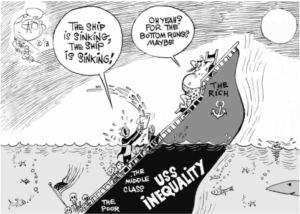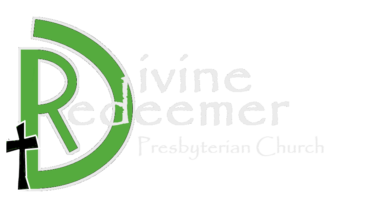
Economic Justice Applied
As we move forward in our examination of the concepts of Justice and Righteousness–Mishpat and Tzedekah—we have considered these divine standards for economic justice:
-The earth (the land) belongs to God, we are stewards, not owners;
therefore, we should do with the goods of creation what the Creator/Owner desires us
to do, not whatever we desire to do.
-The means of production (or capital) should be distributed in a way that allows for all to
have access to it, and those without access to it (like the Levites) should be provided
for.
-These means should be periodically redistributed to ensure that some don’t end up
monopolizing these means for their personal enrichment at the expense of the many
for generations (Jubilee)
Central to the biblical notion of economic justice is the conviction that ALL we have is not ours but God’s, and our role is to be stewards in the interest of the Master. Furthermore, the core interest of the Master is that we use what we have in a way that provides enough for all, not just for a few privileged folk.
Both of these biblical ideals fly in the face of ideas that the Western World as a whole and the United States in particular hold sacred and un assailable: Private Property and Individualism. Our deeply religious convictions about the sacredness of private property as a political construct we will die for are strangely at odds with the biblical injunction that the land belongs to God, and is further at odds with the communal economic practices of Jesus himself with the disciples and later the early church’s Spirit-inspired communal economics.
In the 4th century there was a theological conflict between Augustine of Hippo and Pelagius, a theologian of Celtic origin, regarding the nature of Creation. Augustine argued that created matter emerged ‘ex nihilo’ or out of nothing. Pelagius argued that all created matter was not born of nothing, but born of God and thus bore divine energy and presence. Augustine’s opinion won the day and Pelagius was declared a heretic by vote of the Council at Ephesus. Pelagius warned that setting spirit against matter the way Augustine did would lead to the disregard of Creation and would lead to the exploitation of it by the powers of Empire (Roman Empire at the time, but all empires have followed its lead!). By removing the sacred nature from the created world, Western Christianity has provided the religious justification for the rape of our environment.
In the consumer culture of the West, we have not cultivated a theology of enough, only an appetite for MORE. Rather than structure our economy upon ensuring the shared benefit of the goods of Creation for all, we have embraced with a religious zeal the tenant that when everyone pursues their own self-interest in the marketplace, somehow the common good will magically be served. While there have clearly been some benefits to this free market consumption driven economy, for many, the result has yielded far less than enough, while others have acquire far MORE than enough…and the situation is growing worse, not better.
In the last 50 years, according to a Pew Research in 2020, the wealthiest 20% of Americans expanded their share of our wealth from 43% to more than half of total US wealth (52%). Within that group the top 5% own over 23% of the total wealth of the nation. Meanwhile the same number of people at the bottom (the poorest 20%) have to split among themselves a mere 5% of the nation’s wealth! And the working poor and middle classes have lost more of their share of the US pie as well. Today the income inequality in the US is the worst of all the G7 nations, and the gap between the richest and the poorest American households has more than doubled in the last 50 years.
We are experiencing the concentration of wealth in the hands of fewer and fewer people in our society, and there is little if anything in our national culture or mythology to stop this from worsening. This is precisely the kind of wealth concentration that the Year of Jubilee provisions in Israel were designed to avert through a redistribution of that wealth in the form of land redistribution. Today, we would use the tax structure to accomplish this. In Israel, the 10% tithe for the support of the Levites who owned no land was a way to redistribute some of the wealth of the other tribes to provide for the landless Levites. But when other tribe members lost their land the only way they could recover it was in the Year of Jubilee. A tax structure that reflects the biblical notion of economic justice would require that the nation’s wealthiest persons redistribute their wealth in the form of taxation to ensure that ALL citizens were given some basic support that can guarantee a life with dignity…things like healthcare, education, food, and shelter.
What evidence is there in Jesus’ teaching to support such an idea?? Matthew 25: 14-46 is where I would point. Two parables told by Jesus back to back in Matthew’s gospel—the parable of the Talents (Money) and the parable of the Sheep and Goats (Last Judgment of Nations). In the parable of the Talents—a talent was a particular weight of money-A Master who is known ‘to reap where he didn’t sow’ prepares to leave for a while and ‘entrusts his property’ to each of three servants in the form of a certain amount of money. Two of the servants go out and trade with the money and bring back to the Master some time later double what they had been given. They are praised. The third, fails to use the money in a way that honors the Master’s wishes and the money is taken from him and he is cast out. The central lesson here is about what it means to be the steward of someone else’s property…do with it what the Master would do!!
Applied to our conversation on economic justice this means…your property is not yours, it is God’s. So do with it what God would want done.
And what exactly would God want us to do with the property we have been given to manage? Read the next parable…
The parable of the Sheep and the Goats is the only place Jesus intimates what the nature of Final Judgment will be. It is not an individual judgment, but the judgment of nations. Goat nations and Sheep nations. I often ask, “When did you have a teacher give you both the questions and the answers to a final exam in school before the test?” Likely never. Yet this is exactly what Jesus has done. He shows us what the test will be on and how we should answer it. First, the judge welcomes the sheep nations because they have taken care of the Judge himself unaware by providing food for the hungry, drink for the thirsty, clothes for the naked, care for the sick, welcome to the stranger and human contact for the imprisoned. These are the priorities of the FATHER of humanity! It cannot be made any more clear. The nations that ensure these provisions are praised and welcomed into the ‘kingdom.’ The goat nations that fail to do so, because they could not recognize the priorities of their Maker, much less address them, are cast aside.
These two parables together lay out the clear economic priorities of the Master’s Justice and Righteousness. The vulnerable are to be cared for…period. It is to be an essential priority. To fail to do so has eternal consequences. The economics of the nation should reflect the priorities of the Master or, what has been given will be taken away.
Recently I saw a quote by former president Jimmy Carter who said:
“If you don’t want your tax dollars to help the poor,
then stop saying you want a country based on Christian Values,
because you don’t!”
When I look at the debates around what kind of stimulus spending needs to occur, the most vulnerable should be at the top of the list…When we talk about policies in areas like healthcare, unemployment, education, housing assistance, and immigrants (the ‘strangers’ in Matt 25); the priorities should clearly lean toward ensuring that our resources and our economy are organized to secure the most vulnerable. While there might be disagreements regarding the best ways to do this, there should be NO disagreement as to the objective.
Scripture is clear that God is willing to act to upend systems that do not provide for and protect the vulnerable. Just two New Testament passages to support my claim.
Luke 1 tells the story of Jesus’ pregnant mother, Mary, visiting her cousin Elizabeth, also with child (John the Baptist). At the greeting Mary bursts into a poem/prayer we know as the Magnificat (My soul magnifies the Lord). Within this prophetic outburst we find these verses describing the holy expectation of upheaval because of the coming of the Messiah, Mary’s child…
His mercy is for those who fear him
from generation to generation.
51 He has shown strength with his arm;
he has scattered the proud in the thoughts of their hearts.
52 He has brought down the powerful from their thrones,
and lifted up the lowly;
53 he has filled the hungry with good things,
and sent the rich away empty.
This is a complete overturning of the status quo in favor of the vulnerable ‘lowly’ and ‘hungry’ and a deliberate demoting of the powerful and the proud. God isn’t bluffing on this.
The second additional text describing the attitude God has toward those who cannot seem to prioritize sharing with those in need comes from James 5: 1-6.
Come now, you rich people, weep and wail for the miseries that are coming to you. 2 Your riches have rotted, and your clothes are moth-eaten. 3 Your gold and silver have rusted, and their rust will be evidence against you, and it will eat your flesh like fire. You have laid up treasure[a] for the last days. 4 Listen! The wages of the laborers who mowed your fields, which you kept back by fraud, cry out, and the cries of the harvesters have reached the ears of the Lord of hosts. 5 You have lived on the earth in luxury and in pleasure; you have fattened your hearts in a day of slaughter. 6 You have condemned and murdered the righteous one, who does not resist you.
“You have fattened your hearts on the day of slaughter…” James doesn’t mince words. The rich have gotten rich because of the labor of the poor. Because they have not acted with Tzedekah—the righteousness that demands paying a fair wage. In the divine economy they will pay for their failure to live out the economic justice God desires.
Today, the Coronavirus has ripped the mask off of the historic disparities in our nation and revealed the grave inequities in our economy, our healthcare system and our education system, all of which are failing the most vulnerable who are now the most unemployed and hungry, the ones dying at the highest rates, and the one’s whose children are unable to bridge the digital divide as schools went online.
As we will face the challenge of rebuilding many of these systems in our country over the coming years, we would do well to heed the guidance of scripture on the matter of economic justice.
